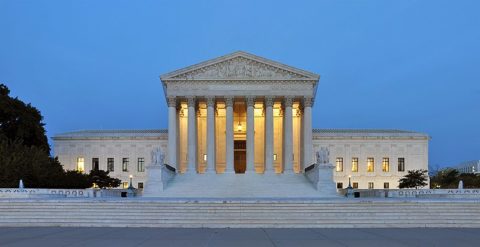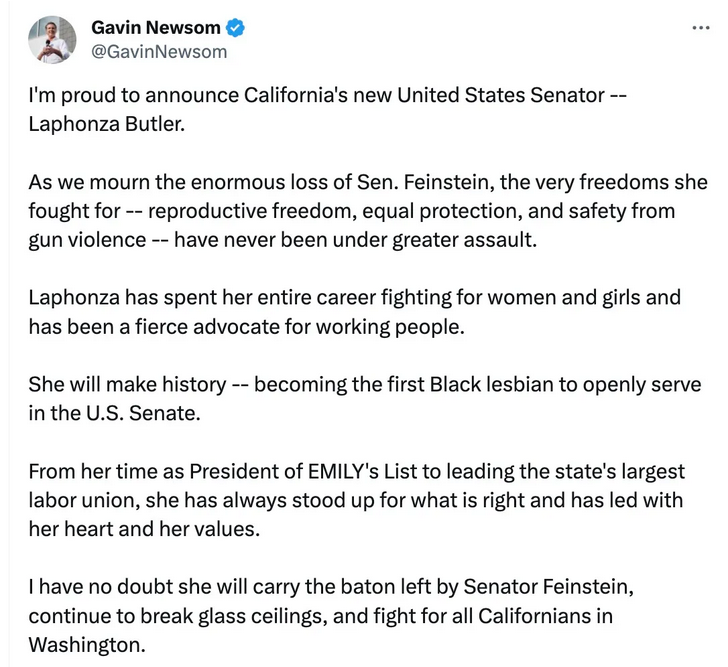I think governments, being human institutions, evolve as people do – and evolution, as we know, is copious, local, and recent. Put as simply as possible: If the government the Founders designed worked as intended (note: IF), it only really worked for them – that is, for Anglo-Celt misfits in a frontier society with, at best, 18th century technology and information velocity.
And in any case, that government – IF it worked as designed – lasted the span of one long-ish (then, average now) human lifetime: 1788-1861.
Most “political” problems, on this theory, can be boiled down to the attempt to retrofit old, unsuitable institutions to new creatures. To take the most basic example, that stuff about a “well-regulated militia” rests on the assumption – integral to a rough frontier society of Anglo-Celt misfits – that everyone is armed, and competent with their arms. This is simply not the case in a more settled society, with the higher information velocity that entails / requires, so we get all the endless wrangling over “gun control” (assuming anyone in that debate was ever arguing in good faith, which is also a big IF, etc.).
One obvious counter to this line of thought is to put it mostly down to technology – just as the Founders couldn’t imagine drones and ballistic missiles and “assault rifles” and the rest while they were writing the 2nd Amendment, so the problems with government can almost all be boiled down to old institutions trying to cope, not with new people, but with new technology.
Severian, “Bio-Marxism Grab Bag”, Founding Questions, 2021-01-21.
November 1, 2023
QotD: The original United States government
October 19, 2023
The evisceration of Bill C-69 (aka the Impact Assessment Act)
The decision of the Supreme Court of Canada to strike down large parts of the federal Impact Assessment Act caught a lot of people by surprise. The court hasn’t made much of a habit of rejecting the federal government’s ever-increasing encroachments on provincial jurisdiction, so this ruling is a bit of a black swan. It’d be nice if the Supremes were going to be more vigilant in future, but that’s unlikely. Colby Cosh explains why this is a “remarkable political moment”:
To hear the Liberals talk now, you would think that the Supreme Court’s 7–2 rebuke of C-69 was a mere bump in the road. Steven Guilbeault, the federal environment minister, appeared on CTV’s Question Period to reassure the public that the law can be “redefined” to accomplish its grandiose intentions; it’s just a matter of “course-correct(ing)” the text a smidgen in order to “comply with the spirit” of the ruling.
Here’s an idea for the minister: maybe just go ahead and comply with the ruling, period?
Comply with the spirit, he says. Having taken the trouble to decrypt the ruling, which is not exactly a masterpiece of lucid clarity, I wonder at the environment minister’s priorities. Rather than appearing on television with a bunch of happy talk, he ought to have been mopping up the seas of blood left by the court’s evisceration of his Impact Assessment Act.
In essence, the Liberals created an apparatus whereby a federal panel would perform environmental and social assessments of major infrastructure projects based on the possibility that they might “cause adverse effects within federal jurisdiction”.
The underlying pretext is that the federal government’s powers are sometimes engaged by the creation of mines, wells, roads and other such projects — even when they are confined within one province’s borders — because they can conceivably affect federal matters such as fisheries, migratory birds, Aboriginal welfare, treaty obligations and other “national concerns”.
This is true as far as it goes, but the court majority’s finding was that this constitutional pretext for creating a federal assessment scheme isn’t actually reflected in the scheme itself. The Liberals, asserting a right to investigate hypothetical infringements on the federal sphere of power, created a law that essentially allows them to veto anything that a province might want to permit.
As the law is written, the initial assessment-agency decision to “designate” a project for assessment can be based on just about anything, including “any comments received … from the public” and “any other factor the Agency considers relevant”. In the final decision-making phase, which is to be based on the “public interest”, specific federal heads of power are also cast aside: whoever makes the final call at the cabinet level is to evaluate a project for “sustainability”, for example.
October 16, 2023
In ?praise? of the “spoils system”
Glenn Reynolds on the way the US government’s structure changed from the “spoils system” of the early republic to the modern “professional” civil service of today:

Andrew Jackson sitting on a hog on top of a tomb with the inscription “To the victors belong the spoils”.
Political cartoon by Thomas Nast, Harper’s Weekly, 28 April, 1877.
America’s institutions need structural reform. We need it in academia, we need it in the corporate world, and we need it in government. In all of these fields, the structures, incentives, and institutions that have grown up over time have been destructive, and need to be fundamentally transformed.
I’ll be writing about all of these things down the line, but for now let’s start with government. Though you don’t hear a lot about it on the right, the left is all bent out of shape over the prospect that a Republican administration elected in 2024 might partially deconstruct the existing protected civil service. I, on the other hand, am excited about that prospect, and only wish they’d go farther.
Prior to the adoption of the Pendleton Act in 1883, government employment operated according to the “spoils system”, which meant that hiring in the executive branch was controlled by the Executive. When a new administration came in, everyone’s job was up for grabs, at least potentially. This “rotation in office” had several advantages, which were widely appreciated at the time, and propounded by presidents from Jefferson to Jackson to Lincoln.
Jackson argued that one serving in government for too long would inevitably lose sight of the public interest and come to use office for personal gain. He also maintained that government was or could be made simple enough for men of ordinary ability and experience, so ‘more is lost by the long continuance of men in office than is generally to be gained by their experience’.1
Contrary to popular belief, though, the arrival of a new president didn’t mean that everyone left. Even Andrew Jackson, upon taking office, replaced only about 10% of the federal work force with his own people. Every president understood the value of continuity, and hiring new people is hard work.
But under the spoils system, the fact that the president could replace anyone mean that everyone worked for him. And that meant both that everyone was responsible to the president, and that the president was responsible for everyone in the government, and everything the government did. This is consistent with the Constitution’s vesting clause, which provides that “The executive Power shall be vested in a President of the United States of America.” If the executive branch does it, it’s an executive power, and if it’s an executive power it should be controlled by the president.
Contrast this to a “professional” civil service, in which the president does neither the hiring nor the firing, except with regard to a comparatively small number of senior officials. The civil service doesn’t think of itself as working for the president, really, and will happily drag its feet when it doesn’t like the president’s priorities. And when the bureaucracy misbehaves, or fails to perform, the president can, at least to a degree, blame its recalcitrance for the trouble or lack of results that occurs.
Congress is also let off the hook, yet simultaneously weirdly empowered. Congress can blame “the bureaucracy” for bad things, even when those things result from laws that Congress has passed. Then it can turn around and “help” constituents by intervening with the bureaucracy it has rendered dysfunctional, earning gratitude that may be deserved in a narrow sense, but not in terms of the big picture.
Under a spoils system, on the other hand, nobody gets off the hook. If the bureaucracy misbehaves, the president can fire the misbehavers. If Congress is unhappy with what bureaucrats do, they can demand that the president fire them, and make an election issue out of it if they want.
So why did we wind up with a civil service? As is typical, the fantasy of a neutral, efficient, expert civil service was laid next to the reality of a messy functioning government. But, as is also typical, the fantasy in practice turned out to be considerably less appealing than as proposed.
1. Robert Maranto, Thinking the Unthinkable in Public Administration: A Case for Spoils in the Federal Bureaucracy, Administration & Society, January 1998, 623,625.
October 4, 2023
“John Adams said that a republican constitutional structure didn’t guarantee republican virtue in government”
Chris Bray reflects on the 17th amendment to the US Constitution in light of the appointment of California’s new senator:

California Governor Gavin Newsom speaking at the 2019 California Democratic Party State Convention in San Francisco, California on 1 June, 2019.
Photo by Gage Skidmore via Wikimedia Commons.
… the Senate was supposed to be the national storehouse of wisdom, restraint, discipline, and worldly experience. You may already be seeing that we wandered away from this idea at some point.
The 17th Amendment, ratified in 1913, gave voters the power to directly elect senators, reducing the influence of state legislatures and opening the upper house to mass media popularity contests. The 16th Amendment — “Congress shall have power to lay and collect taxes on incomes” — was ratified the same year, a one-two punch of Progressive centralization of power.
The democratizing and centralizing character of the 17th Amendment gave us a parade of powerful idiots that culminated in John Fetterman, passing through Mazie Hirono and the professional Ted Baxter impersonator Sheldon Whitehouse, so it looks like a failure. But we’ve just run an experiment, thanks to Dianne Feinstein’s white-knuckled grip on her personal status, and the results are … interesting.
The California legislature, in its infinite wisdom, has given the governor the unilateral authority to appoint Feinstein’s replacement, so we’re not quite seeing the exact duplicate of the original constitutional design for the Senate. But we’re seeing something like it: a senator chosen by something other than the popular vote, elevated to the Senate after selection by a longtime state official who has deep personal familiarity with the pool of people who might do the job. You know, a statesman.
Newsom’s choice for Feinstein’s seat is almost miraculous in its awfulness, an appointment distinguished by cravenness and sleazy insiderism. Naming a new senator from a state with 39 million people in it, he has chosen the Maryland resident Laphonza Butler — who has never held any elected office anywhere.
Butler is a career activist and party hack, an SEIU official who went on to run the abortion PAC EMILYs List. She is, in other words, one of the people whose function in life has been to raise money for the Democratic Party. She’s an ATM, and she’s never been anything else. She’s being appointed to the United States Senate without having ever convinced any voters anywhere to elect her to anything, and she’s rising to the upper house of the national legislature with no experience of any kind in any relevant field. Advice and consent on foreign policy? Confirmation of judicial nominees? Well, she has experience raising money for candidates, so. It’s a straight payoff: generate cash for the party for twenty years, get a free high-status ride in the Senate.
Here’s how Newsom explains the choice:
She’s a black lesbian who gives us money, end of statement. California’s idiot politicians find the choice exciting.
September 22, 2023
Political psychosis and the never-ending “narrative”
Chris Bray points out several instances of the legacy media continuing to push “the narrative” despite any inconvenient facts that cast doubt on the official story:
Every day is opposite day. Every day is a bucket of fake. The narrative is the narrative; once it’s established, nothing penetrates it. It rattles on down the road, impervious to inputs, convinced of its own truth without regard to events outside the shell. Psychologists have a term for this.
So Politico warns this week that faith in vaccines is falling, and anti-vaxxer narratives are “on the rise.” Sample paragraph, this one describing Health Secretary Xavier Becerra:
The summer of 2023, a claim made in June and credulously repeated in the bottom half of September: If you take Covid vaccines, you can’t get sick, but if you don’t take Covid vaccines, you die. Government leaders who don’t push the 7th and 8th doses of the mRNA injections “choose not to take care of their people”.
[…]
But the narrative rolls on, unperturbed. If you’re dying of Covid, it’s because you hesitated to get your 7,369th dose, anti-vaxxer! Maybe you should have stopped being such a Nazi! In the news media, it’s 2021 forever, and the virtuous science-lovers are rolling up their sleeves to rebuke the science-hating morons, who will not survive the … okay, well, who will not survive the next … okay, well, YOU’LL PROBABLY DIE AT SOME POINT because you didn’t get it. You’re facing a winter of severe illness and death by 2054, at the latest. No amount of evidence will force the storytellers to stop telling this story. It’s the story, so they tell it. The Politico thing ends by quoting Peter Hotez, by the way, as you knew it would.
Similarly, The Atlantic warns now that Donald Trump was a time bomb who kept nearly going off for four years, and only the courage of General Mark Milley kept him under control. Look at the premise at the top of the piece: Disobeying, resisting, and undermining the President of the United States, a military officer protected the Constitution.
How well does the story parse the constitutional issues at stake? This well:
The military decided to have an abortion travel policy, and to fund it. A senator is now interfering in military policy and the unilateral executive appropriations of the Department of Defense, a sign of the ongoing constitutional crisis that began with Trump. Typically, you see, in our constitutional order, the military does whatever it wants, and spends money on its own authority however it feels like spending it, but Tuberville is engaging in the “unprecedented” act of suggesting that Congress should decide how to appropriate federal funds and regulate the armed forces, which means that he hates the Constitution. Article I, Section 8 would like a word, in this obviously extremist description of the authority of Congress:
To raise and support Armies, but no Appropriation of Money to that Use shall be for a longer Term than two Years;
To provide and maintain a Navy;
To make Rules for the Government and Regulation of the land and naval Forces;
And so on. Why is Tommy Tuberville being such a Nazi?
May 9, 2023
Uncancelled History with Douglas Murray | EP. 03 Thomas Jefferson
Nebulous Media
Published 6 Dec 2022Jean Yarbrough joins Douglas Murray on this episode to discuss Thomas Jefferson’s life and legacy. They talk about the Declaration of Independence, his presidency, and the various controversies that have surrounded him. Should Thomas Jefferson stay cancelled?
(more…)
February 26, 2023
The role of Vice President of the United States is, constitutionally, pretty lightweight
For most Americans, the Vice President is seen not only as potentially the next President but also as a fairly significant official in the administration, yet this isn’t the way the job was envisioned by the Founding Fathers, as Glenn Reynolds explains:
Mike Pence is arguing that the Vice President is a legislative, not an executive, officer. Mike Luttig has a piece in the NYT calling that crazy. (Link is to Josh Blackman’s blog post on same. Luttig’s piece is here, but it’s paywalled.)
Well, as it happens, I had a piece on the topic in the NYT over a decade ago, and I’ve also authored a piece in the Northwestern University Law Review on the topic, and I say he’s not crazy.
Nowadays, we tend to think of Vice Presidents – wrongly – as a sort of junior or co-President, but that’s not actually how it works at all. As I wrote in the Northwestern Law Review piece:
The Constitution gives the Vice President no executive powers; the Vice President’s only duties are to preside over the Senate and to become President if the serving President dies or leaves office. Traditionally, what staff, office, and perquisites the Vice President enjoyed came via the Senate; it was not until Spiro Agnew mounted a legislative push that the Vice President got his own budget line. The Vice President really is not an executive official. He or she executes no laws — and is not part of the President’s administration the way that other officials are. The Vice President cannot be fired by the President; as an independently elected officeholder, he can be removed only by Congress via impeachment.
In various cases involving the Executive power, the Supreme Court has placed a lot of weight on the question of whether an official can be fired by the President or not.
Continuing:
Traditionally, Vice Presidents have not done much, which is why the position was famously characterized by Vice President John Nance Garner as “[not] worth a pitcher of warm spit”. That changed when Jimmy Carter gave Fritz Mondale an unusual degree of responsibility, a move replicated in subsequent administrations, particularly under Clinton/Gore and Bush/Cheney.
The expansion of vice presidential power, however, obscures a key point. Whatever executive power a Vice President exercises is exercised because it is delegated by the President, not because the Vice President posesses any executive power already. The Vesting Clause of Article II vests all the executive power in the President, with no residuum left over for anyone else. Constitutionally speaking, the Vice President is not a junior or co-President, but merely a President-in-waiting, notwithstanding recent political trends otherwise. To the extent the President delegates actual power and does not simply accept recommendations for action, the Vice President is exercising executive authority delegated by the President while being immune to removal from office by the President, unlike everyone else who exercises delegated power. The only recourse for the President is withdrawal of the delegation, with instruction to subordinate officials within the Executive Branch not to listen to the Vice President. However, it seems pretty clear that the President is not allowed to delegate executive power to a legislative official, as that would be a separation of powers violation.
The point of my argument there was to note that, by arguing that Vice President Cheney was not subject to the Freedom of Information Act because he was a legislative official, the White House had raised the question of whether President George W. Bush’s extensive delegation of executive powers to Cheney was unconstitutional. (Hence the title, “Is Dick Cheney Unconstitutional?”)
February 21, 2023
Larry Correia’s In Defense of the Second Amendment
In the latest Libertarian Enterprise, Charles Curley reviews Larry Correia’s latest non-fiction book:
The name Larry Correia may ring a bell for Libertarian Enterprise readers. He has written fiction since 2008. He started with Monster Hunter, a self-published novel that later got a contract from Baen Books. He has since become a New York Times best selling author, and a finalist for the John Campbell award.
He also originated the Sad Puppies campaign, an effort to turn the Hugos away from their politically correct drift.
Yeah, guns and science fiction. TLE readers should appreciate that combination.
First off, this is not a scholarly exercise, nor does it break much new ground in the gun control arena. If you want scholarly language, look elsewhere, to, say, Don Kates, Stephen Halbrook, or David Kopel: in places this book is more of a rant than a treatise. So if you enjoy the snark of L. Neil Smith or H. L. Mencken, you’ll like this book. None the less, it has 12 pages of end notes and five pages of index. (But, oddly enough, no table of contents.)
Correia says so: “This book isn’t intended for policy wonks and pundits. I’m not an academic. I’m not a statistician. I’m a writer who knows a lot about guns.” (p. 23) And he’s tired of hearing the same tired old stuff trotted out again and again in any discussion about gun control. This book is his reply. “I won’t lie, I’d like this book to give ammo to the people on my side of the debate. To those of you who are on the fence, undecided, I want to help you understand more about how crime and gun control laws actually work.” (p. 23)
Chapter One is entitled Guns and Vultures. The vultures are the people who feed on every tragedy, trying to fit it into their agenda of more gun control and more dependence on the state. The people who heed Rahm Emmanuel’s famous dictum: “You never want a serious crisis to go to waste.” The people who wring their hands and say, we have to do something! even when the something has been tried before and found wanting, or even found impossible.
Much of the book is devoted to refuting the anti-gun arguments. I trust I needn’t outline those to TLE readers.
Note that while he’s confident that the book is well worth reading, he hasn’t actually read any of Larry’s fiction writing, so he can’t be dismissed as a fan who’d automatically recommend the book.
January 8, 2023
Conservatives “vote harder”, progressives take advantage of “procedural outcome manipulations”
Theophilus Chilton on a key difference between progressives and conservatives in how they address perceived problems with “the system”:

“Polling Place Vote Here” by Scott Beale is licensed under CC BY-NC-ND 2.0 .
Over the past decade or so, many folks on the broad Right have noticed that practically all of our institutions don’t really work as they should. The natural tendency on the part of normie conservatives is to chalk this up to incompetence and corruption. Granted, those do come into play – and will continue to do so increasingly. Yet structurally speaking, our institutional dysfunctionality runs a lot deeper than a little graft or some skimming off the top. Our institutional failures are both purposeful and towards a specific end.
Normies can perhaps be forgiven for not immediately coming to this conclusion. After all, as the name suggests, they’re the norm. They’re the mainstream. They’re not out on the “fringe” somewhere, for better or for worse. These are conservatives who have been conditioned by decades of playing by the rules to trust the rules and the processes under which government and institutions operate (even if they think they “distrust government” or whatever). They’re the ones who believe we have to keep voting harder because voting is the only “proper” way to act in our system. And yet, many times they end up being mystified that not only do the institutions and procedures not “work right” but that nobody in power (even their own so-called representatives) seems the least bit bothered by this.
Yet, purposeful it truly is. There is a concept about our institutions that I wish every conservative understood, which is that of “manipulating procedure outcomes”. Basically, what this refers to is the process by which bad actors will take an established procedure — a rule or statute, an institution inside or outside of government, a social or political norm — and subvert it to their own use while still “technically” adhering to procedure. However, the process of doing so completely warps the results from those which “should” happen had the procedure been played straight. This intentionality explains why our institutional failures always seem to tend in one direction — Cthulhu always seems to swim left, so to speak. The American Left are masters at manipulating procedural outcomes, while the American Right rigidly tries to adhere to “the way things oughta be” and end up getting outmanoeuvered every time.
Allow me to give some examples of this; seeing them will start to train the eye towards recognising other instances of this process.
Let’s take, for example, the recent revelations of government censorship of dissident ideas and individuals that we saw in the Twitter files. Now, we all know that the government can’t censor speech and ideas because of the First Amendment. So this means that they’d never do so … right? (LOL) Well, as the Twitter files revealed — and which absolutely assuredly applies to every other major tech company in the field — FedGov and the alphabet agencies simply use companies like Twitter as a way to work around the 1A. They can’t censor directly, but they can rely upon a combination of selective pressure on tech companies and ideologically friendly personnel within these companies to censor and gather information about right-leaning, and especially dissident Right, users all the same. And technically, none of this is illegal, because muh private company and all that. So a functional illegality nevertheless remains within the boundaries of “procedure”.
The same type of manipulation is underway with regards to the Second Amendment, too. Again, the plain wording of the 2A, as well as a long train of prior judicial interpretive precedence, militates against federal and state governments really being able to restrict the gun rights of Americans (not that they don’t try anywise). They can’t make it illegal to buy or own guns. Schemes like prohibitively taxing ammo won’t pass muster either. So if you’re a left-wing fruitcake who hates the Constitution and badly wants to disarm your fellow Americans for further nefarious purposes, what do you do?
Well, you make it too legally dangerous for gun owners to actually use their guns for anything beyond target shooting. You install a bunch of Soros-funded prosecutors in all the jurisdictions that you can so that you can go light on criminals but throw the book at gun owners who defend themselves from criminals. You creatively interpret laws to mean that harming someone while defending yourself is a crime or, barring that, open up self-defenders to civil attack from the criminal’s family. From a self-defence perspective you set up an anarchotyrannical regimen that can be used against ideological enemies. This is basically the same thing the Bolsheviks did when they were consolidating their power as “Russia” transitioned to “the Soviet Union”, as recorded by Solzhenitsin in The Gulag Archipelago. They used administrative courts and ideological judges to punish people who legitimately defended themselves against criminals. If you injured someone who was attacking or robbing you, you went to the gulag. Of course, as we’re also seeing today, these criminals were functionally agents of the Regime by that point.
August 18, 2022
MAID in Canada
In The Critic, Ben Woodfinden discusses the maple-flavoured slippery slope we’re gaining speed on: what’s known as “Medical Assistance In Dying (MAID)”:
Canada is widely seen as one of the world’s most progressive nations in the world, “leading the way” (depending on where you stand) on a variety of social issues. But in recent months, Canada has been garnering some less than savoury international attention because of the dark side of one of its recent progressive accomplishments, namely the assisted suicide regime that has been created since the Supreme Court struck down prohibitions on assisted suicide in 2015. The tragic situation that has developed in Canada offers a warning to Britain and other countries considering going down a similar path, both to be cautious about opening the assisted suicide floodgates and about empowering judges to decide whether such things should be allowed.
When Canada’s enlightened judicial philsopher kings and queens overturned criminal prohibitions on assisted suicide in Carter v. Canada, they overturned their own precedent. In 1993 a majority of the Supreme Court found that the criminal code provisions that prohibited assisted suicide did not ultimately violate the Canadian Charter. In 2015 the Court changed its mind. The law didn’t change, of course, but the court decided that “the matrix of legislative and social facts” surrounding the case had changed. Thus the interpretation of constitutional rights must change with them.
Plenty of the same people who were outraged that the United States Supreme Court would overturn precedent on seminal abortion decisions, seemingly had no problem with the overturning of precedent in this Canadian case. This is because implicit in the view of rights and judicial review that many progressives hold, is that it is perfectly acceptable to overturn precedent in the name of expanding or establishing some newly discovered right — but once this is done, the debate is settled and there can be no reasonable dissent or change of heart. History, it seems, only marches in one direction.
An important part of the Carter decision, where the court determined that relevant social facts had changed, was essentially a blithe dismissal of exactly what has come to pass in Canada less than a decade after the decision. The court rejected the concern that once assisted suicide was allowed in some rare cases, there would be a “slippery slope” from helping terminally ill people end their lives, to a system in which vulnerable people like the disabled were caught in a euthanising net.
Evidence presented in the case by a medical expert from Belgium that this might be possible, was dismissed by the court because “the permissive regime in Belgium is the product of a very different medico-legal culture”. Unlike those barbaric Belgians, enlightened Canada could avoid sliding down this slippery slope in which safeguards are easily gotten around. They would avoid the creeping expansion of eligibility by setting up a “carefully regulated scheme” that would keep its application narrow and exceptional.
Spoiler: No. No, we didn’t.
July 16, 2022
A viable … conservative … party in Quebec? Isn’t that somewhere in Revelations?
In the free-to-cheapskates portion of a Paul Wells column on the unlikely and certainly unpredicted rise of a conservative party in Quebec, he points out just how ephemeral such parties have been in the past:
My Big Book of Columnists’ Clichés tells me I should call Duhaime the leader of Quebec’s “upstart” Conservative party, but if we’re being accurate here, it hasn’t really upstarted yet. Or maybe it keeps upstarting and then unstarting. Quebec had a Parti conservateur in the 19th and early 20th centuries, under whose banner eight premiers were elected. Maurice Duplessis essentially shut it down in the 1930s when he formed the Union Nationale. There was a Parti conservateur for a minute in the mid-60s, to no great effect. And there’s been a Parti conservateur since 2009.
The latest party’s impact on electoral politics so far has been negligible. It won less than 1.5% of the vote in 2018, the year Legault’s amorphous populist-nationalist Coalition Avenir Québec (CAQ) swept to power. It’s never elected a member to the National Assembly. For the past year, its only MNA has been a woman who got booted from Legault’s party for, uh, contributing to Duhaime’s.
But things have been getting weird in Quebec this year. An Angus Reid Institute poll last week put Duhaime’s upstart party (see how easy it is?) in second place, well behind Legault’s CAQ but ahead of the historic Liberal and PQ parties and the urban social democrats in Québec Solidaire.
The Quebec Conservatives are, in fact, the leading party among male voters age 18-34 and 35-54. They’re not nearly as competitive among young women or among older voters in general. Duhaime would need his vote to keep growing, and not just a little, to have any chance of winning an election. Frankly he’s likelier to win zero seats, and perhaps likeliest to win somewhere between zero and a dozen.
But the party has already gone from 500 memberships to 60,000 since Duhaime, a former Ottawa political staffer (Bloc Québécois, then Canadian Alliance) and Quebec City talk-radio host, became its leader in 2021. That’s three times as many memberships as the CAQ had when Legault became premier.
Duhaime is working on something, a discourse starkly different from Legault’s and also different, in important ways, from the recent positions of the federal Conservatives. He’s against vaccine restrictions — but he’s been careful not to associate with truck convoy protesters. He’s against Legault’s new French language law, Bill 96. Not because it’s mean to anglophones, although Duhaime is making at least a modest attempt to appeal to conservative anglophone voters, but because the law makes blanket use of the Constitution’s “notwithstanding” clause to sidestep Charter rights. Duhaime says no government should curtail rights so easily. He wants a great big dose of private for-profit health care.
After two years of legislation by order-in-council and intermittent curfews and the most sweeping use of the notwithstanding clause in 40 years, Legault’s Premier-knows-best shtick has opened up room on his libertarian right. Enough room for a solid competitor? Duhaime himself shrugged when I asked him, during a brief chat after the parking-lot scrum.
“We might win this,” he said. “We might get zero seats. On est la ‘wild card’ de la gang.”
July 6, 2022
“The Great Charter of the Liberties” was signed on June 15, 1215 at Runnymede
Ed West on the connections between England’s Magna Carta and the American system (at least before the “Imperial Presidency” and the modern administrative state overwhelmed the Republic’s traditional division of powers):

King John signs Magna Carta on June 15, 1215 at Runnymede; coloured wood engraving, 19th century.
Original artist unknown, held by the Granger Collection, New York. Image via Wikimedia Commons.
England does not really go in for national monuments, and when it does they are often eccentric. There is no great shrine to Alfred the Great, for example, the great founder of our nation, but we do have, right in the middle of London, a large marble memorial to the animals that gave their lives in the fight against fascism. And Runnymede, which you could say is the birthplace of English liberty, would be a deserted lay-by were it not for the Americans.
Beside the Thames, some 10 miles outside London’s western suburbs, this place “between Windsor and Staines”, as it is called in the original document, is a rather subdued spot, with the sound of constant traffic close by. Once there you might not know it was such a momentous place were it not for an enclosure with a small Romanesque circus, paid for by the American Association of Lawyers in 1957.
American lawyers are possibly not the most beloved group on earth, but it would be an awful world without them, and for that we must thank the men who on June 15, 1215 forced the king of England to agree to a document, “The Great Charter of the Liberties”.
Although John went back on the agreement almost immediately, and the country fell into civil war, by the end of the century Magna Carta had been written into English law; today, 800 years later, it is considered the most important legal document in history. As the great 18th-century statesman William Pitt the Elder put it, Magna Carta is “the Bible of the English Constitution”.
It was also, perhaps more importantly to the world, a huge influence on the United States. That is why today the doors to America’s Supreme Court feature eight panels showing great moments in legal history, one with an angry-looking King John facing a baron in 1215.
Magna Carta failed as a peace treaty, but after John’s death in 1216 the charter was reissued the following year, an act of desperation by the guardians of the new boy king Henry III. In 1300 his son Edward I reconfirmed the Charter when there was further discontent among the aristocracy; the monarch may have been lying to everyone in doing so, but he at least helped establish the precedent that kings were supposed to pretend to be bound by rules.
From then on Parliament often reaffirmed Magna Carta to the monarch, with 40 such announcements by 1400. Clause 39 heavily influenced the so-called “six statutes” of Edward III, which declared, among other things, that “no man, of whatever estate or condition he may be … could be dispossessed, imprisoned, or executed without due process of law”, the first time that phrase was used.
Magna Carta was last issued in 1423 and then barely referenced in the later 15th or 16th centuries, with the country going through periods of dynastic fighting followed by Tudor despotism and religious conflict. By Elizabeth I’s time, Magna Carta was so little cared about that Shakespeare’s play King John didn’t even mention it.
July 4, 2022
A first, tentative step to reining back the juggernaut that is the modern administrative state
Brad Polumbo has words of praise for US Supreme Court Justice Neil Gorsuch:

Panorama of the west facade of United States Supreme Court Building at dusk in Washington, D.C., 10 October, 2011.
Photo by Joe Ravi via Wikimedia Commons.
“Vesting federal legislative power in Congress [rather than bureaucrats]”, Gorsuch writes, “is vital because the framers believed that a republic — a thing of the people — would be more likely to enact just laws than a regime administered by a ruling class of largely unaccountable ‘ministers’.”
But what about those, like dissenting Justice Elena Kagan, who say that federal bureaucrats need wide latitude because Congress is failing to, in their view, adequately address climate change?
“Admittedly, lawmaking under our Constitution can be difficult,” Gorsuch acknowledges. “But that is nothing particular to our time nor any accident.”
“The framers believed that the power to make new laws regulating private conduct was a grave one that could, if not properly checked, pose a serious threat to individual liberty …” he said. “As a result, the framers deliberately sought to make lawmaking difficult by insisting that two houses of Congress must agree to any new law and the President must concur or a legislative supermajority must override his veto.”
With an empowered, unelected bureaucracy, “agencies could churn out new laws more or less at whim”, Gorsuch adds. “Intrusions on liberty would not be difficult and rare, but easy and profuse.”
This isn’t hypothetical speculation — it’s exactly what we’ve seen under the status quo.
For a glaring example, just consider the Centers for Disease Control’s pandemic-era “eviction moratorium”. The federal agency unilaterally declared that evictions nationwide were prohibited in many circumstances by citing an old statute that gave the CDC director the ability to order in specific places “such measures to prevent such spread of the diseases as he/she deems reasonably necessary, including inspection, fumigation, disinfection, sanitation, pest extermination, and destruction of animals or articles believed to be sources of infection.”
They went from that to a nationwide “eviction moratorium”. Stretch, much?
That’s right: Unelected government officials effectively commandeered the nation’s rental market, which caused tremendous dysfunction, trampled over property rights, and sabotaged the supply of rental housing. (For which prices are now surging. Shocker!) And, it was years before the courts finally stopped them and struck down the “moratorium”.
May 6, 2022
“Canadians might not know their constitutional history or even the text of the Charter, but they know in their bones that these orders were unconstitutional”
Long before the Freedom Convoy protests earlier this year, I’d been somewhat skeptical of the value of the Canadian Charter of Rights and Freedoms — not that I thought it was a bad thing to have a clear enumeration of Canadians’ rights, but in the degree to which those rights could be ignored or abrogated whenever the government found it convenient to do so. The invocation of the Emergencies Act proved that lacking strong and effective absolute rights, the Charter was merely a bit of tissue paper. In The Line, Josh Dehass shows he’s not as cynical as I am about the value of the Charter and provides some history predating the current document:
In a Boston courtroom in 1761, lawyer James Otis Jr. made one of the most consequential legal arguments of all time.
Otis was challenging the legality of “writs of assistance”, a form of general warrant giving unfettered discretion to customs agents to force their way into people’s homes to search for and seize smuggled goods, and to require the “assistance” of bystanders.
“It appears to me (may it please your honours) the worst instrument of arbitrary power, the most destructive of English liberty, and the fundamental principles of the constitution, that ever was found in an English law-book,” Otis inveighed.
John Adams later described that day in court as “the first scene of the first Act of opposition to the Arbitrary claims of Great Britain. Then and there the Child Independence was born. Every Man of an immense crowded Audience appeared to me to go away, as I did, ready to take Arms against Writs of Assistants.”
This hard-won right to be secure against unreasonable searches and seizures, affirmed by Section 8 of the Canadian Charter of Rights and Freedoms, is the reason so many of us felt queasy about the Emergency Economic Measures ordered by the Liberal cabinet under the Emergencies Act in February to quell the trucker protests. Canadians might not know their constitutional history or even the text of the Charter, but they know in their bones that these orders were unconstitutional.
The emergency measures required financial institutions to search their records for customers suspected of “directly or indirectly” engaging in a “public assembly that may reasonably be expected to lead to a breach of the peace”, or “directly or indirectly” using their money to facilitate such protests, and then seize their accounts.
That’s a classic general warrant, a writ of assistance in fact, enlisting banks to help King Trudeau and Queen Freeland hunt down their political enemies without going before a judge to prove reasonable grounds that a specific offence had been committed by a specific person. Section 8 is designed to keep us secure against unreasonable searches and seizures by the executive, and the only way for individuals to maintain this security is by requiring specific warrants from an independent judiciary, barring exigent circumstances.
This profound assault on our section 8 right will hopefully be raised during Justice Paul Rouleau’s inquiry into the use of the Emergencies Act, despite Trudeau’s attempt to focus the inquiry on the truckers themselves. Even if section 8 doesn’t get examined during the inquiry, the Canadian Civil Liberties Association expects to raise it in Federal Court if they’re successful in convincing a judge to review the decision to declare the protests a national emergency.
I don’t expect anything useful to come out of this inquiry process, otherwise Trudeau wouldn’t have let it get started in the first place.
March 21, 2022
Republic to Empire: Sulla A Failed Reaction
seangabb
Published 10 Feb 2021In 120 BC, Rome was a republic with touches of democracy. A century later, it was a divine right military dictatorship. Between January and March 2021, Sean Gabb explored this transformation with his students. Here is one of his lectures. All student contributions have been removed.
(more…)














